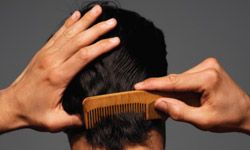You might have an enviable head of hair that is thick and shiny and a wardrobe that is fashionable and well-kept. But if you have dandruff, your mane and attire may go unnoticed. Instead, the focus may be on those flakes lingering on your shoulders, back and scalp.
Dandruff is a very common, generally harmless scalp condition that affects at least 50 percent of the human population [source: P&G Beauty Science]. Frustratingly, there are many possible causes of dandruff. Sometimes either dry or oily skin can be to blame. So can skin conditions like eczema and psoriasis. In some cases, a yeast fungus called malassezia or an oily skin condition called seborrheic dermatitis can cause the flaking.
Advertisement
The good news is that dandruff is usually quite easy to treat. The hair care aisle at your local drugstore or supermarket probably has a number of shampoos, conditioners and special preparations designed to eliminate the embarrassing condition. There are even prescription solutions available. But as with many other health conditions, prevention is usually the best treatment. So, if you're prone to the itchy scalp and telltale flakes of dandruff, learn how to keep them at bay with a few simple preventive measures. In no time, your luxurious locks and trendy threads will once again steal the show.


